Explosion At Iranian Power Plant Claims Lives
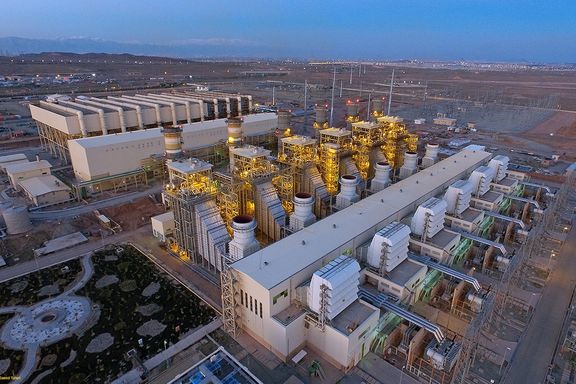
An explosion has rocked the Parand power plant on the outskirts of Tehran, with at least two dead and several others injured.

An explosion has rocked the Parand power plant on the outskirts of Tehran, with at least two dead and several others injured.
Governor Omid Ahmadi, who is overseeing Robat Karim County where the power plant is located, attributed the explosion to "staffers' negligence." The blast occurred in a gas pipeline responsible for delivering fuel to the plant's turbines.
Ahmadi further claimed despite damage to a section of the gas pipeline, the power plant's operations continued without interruption with no reports of damage to its infrastructure.
The Parand power plant, designed to generate 50 megawatts of electricity, was part of a plan to connect it to the national power grid, aiming to address voltage issues within the capital's electricity network.
The incident is part of a series of unexplained explosions and fires that have plagued various Iranian military, nuclear, and industrial facilities since mid-2020.
Of particular note is a significant fire that erupted on January 28 in an Iranian military industry factory in Esfahan, suspected to be a result of a drone strike. While authorities have not provided comprehensive explanations for the incidents, they have linked several high-profile sabotage attacks on facilities to Israel. Israel has not officially claimed responsibility for any of these events.

Masoud Pezeshkian, a member of the Iranian parliament, has warned of the growing migration of healthcare professionals threatening to leave the country in a dire shortage.
In an interview with Rouydad 24, Pezeshkian stated that, while precise statistics on doctor emigration are lacking, it is evident that a significant number have left Iran for various reasons.
“Those who have remained are often constrained by low salaries, making it increasingly challenging to maintain their quality of life. With a monthly income equivalent to $200 to $300, many healthcare professionals find it difficult to afford housing and their children's education,” he said.
Driven by a combination of economic hardships, professional constraints, and the lack of social and political freedoms, a growing number of healthcare professionals, including physicians, dentists, midwives, and nurses, have either emigrated in recent years or are actively planning to do so.
He emphasized that the primary challenge driving the exodus is financial, as low salaries and high living costs push professionals to seek better opportunities abroad. Despite Iran's abundant resources, which include oil, gas, minerals, water, and a well-educated workforce, mismanagement, and a failure to utilize these resources efficiently contribute to the country's economic challenges.
Pezeshkian concluded by warning that the consequences of the ongoing healthcare professional migration crisis will become apparent in the coming years, sentiments echoed now for many months, worsened since the uprising of the Women, Life, Freedom movement last September.
In February, Mohammad Sharifi-Moghadam, a member of the central council of Iran's Nurses’ Organization, estimated that between 2,500 to 3,000 nurses emigrate from Iran annually.
More recently, in May, MP Hossein Ali Shahriari, chairman of the Iranian parliament's Health and Treatment Committee, said Around 10,000 healthcare practitioners have left Iran over the past two years to work in the Arab world.
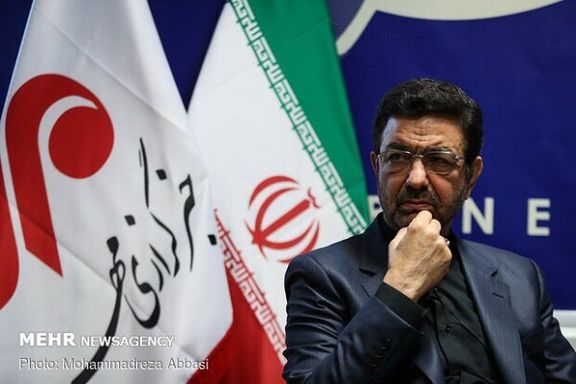
Iranian officials continue to signal the possibility of an expanded front against Israel, despite repeated denials of the regime's green light to the Hamas attack on Israel.
Fadahossein Maleki, a member of the National Security Committee in the Iranian Parliament, said, "If Israel continues its ruthless operations, we will form a new front, extending far beyond the 1973 front [Yom Kippur War], which led to Israel's defeat. In the new front, Iran will play a significant role."
As thousands of Israelis and Palestinians continue to lose their lives in the conflict initiated by Hamas which bombarded Israel with thousands of missiles and an infiltration of its terror troops on October 7, he said the wave of support seen around the world is because "Palestine and its people hold a special place among the Muslim world."
Iran's proxy Hezbollah has already been actively attempting to infiltrate Israel's northern border in addition to sending UAVs and anti-tank missiles since the war began. Last week, Iran's Yemen proxy, the Houthis, also sent cruise missiles and drones launched toward Israel, intercepted by the US Navy.
Supporting the events of October 7 when Hamas declared war on Israel, Maleki justified the terror group's attack which saw hundreds of civilians slaughtered, including pregnant women, children and the elderly. A further 212 or more are being held hostage by the terror group in Gaza.
He said, "The actions taken by Hamas are, in fact, a response to the excessive Israeli aggression, where they showed no mercy towards the people. Such actions have led to a wave of hatred against Israel in the Islamic world, especially among the Muslim community."
Maleki is one of a stream of regime officials pushing for escalation, including Iran's Minister of Foreign Affairs, Hossein Amir-Abdollahian, who has been issuing almost daily threats of aggression claiming that its proxies will be activated if Israel does not offer a ceasefire.
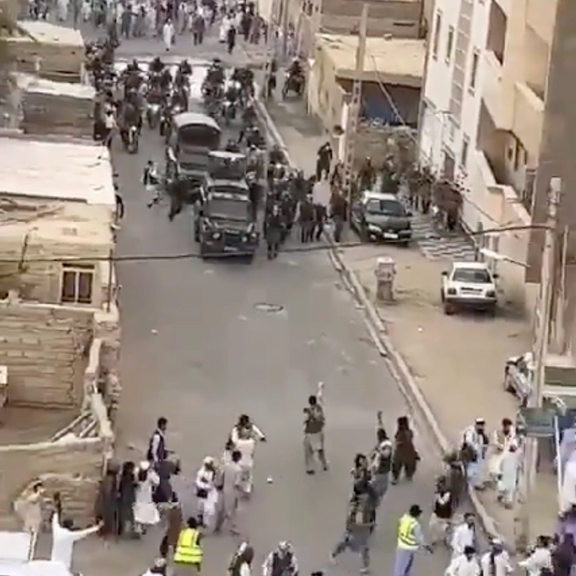
Fifty people have been arrested during the Friday protests in the volatile city of Zahedan, including 13 children.
US-based Human Rights Activists News Agency (HRANA) shared videos on social media showing the presence of special guard forces around the Makki Mosque and the use of significant force during the arrests of numerous citizens in the city.
In response to the recent crackdown on protesters, Fazl ul-Rahman Kouhi, the Friday prayer Imam of Pashamag village in Sarbaz County, Sistan and Baluchestan, stated that "the attack of military forces on the worshipers in Zahedan is no less oppressive than the actions of Israel against the people of Palestine."
Notably, Kouhi himself had been detained in 2019, and Sunni clergymen in Baluchestan are currently facing pressure from the Iranian regime.
In the images from the protests on Friday, participants chanted slogans such as "Neither Gaza nor Lebanon, My Life for Iran" and "From Zahedan to Gaza, the Whole World is Shaking."
Recent reports indicate an escalation in pressure on Sunni and Baluch clerics to discourage the Friday protests in various cities within the province. Nevertheless, the weekly protests by Zahedan residents persist.

As candidates registered for Iran's parliamentary elections, politicians in the reform camp expressed concern regarding the potential disqualification of many candidates.
On the initial day of registration October 19, a total of 959 candidates officially entered the race, with the registration process set to continue for an additional week. Earlier, an unofficial registration process saw approximately 49,000 candidates vying for the 290 parliamentary seats in Iran's Majles, in the elections scheduled for March.
The registration unfolds in the midst of widespread observations that the Majles (parliament) no longer holds a pivotal role in decision-making within Iran. Supreme Leader Ali Khamenei has significantly curtailed the parliament's authority by transferring key decision-making responsibilities to the heads of the government's three branches or the Expediency Council, a non-elected body whose members are directly appointed by Khamenei.
Simultaneously, grievances persist regarding the vetting process, as the Guardian Council, responsible for approving candidates, often arbitrarily disqualifies individuals who do not align with Khamenei's preferences. In recent rounds of presidential and parliamentary elections, the Council disqualified all reformist and moderate candidates, effectively consolidating power in Iran in the hands of ultraconservatives who have exhibited inefficiency in their governance.
Certain reformist figures have already chosen to boycott the elections, while others, such as former President Mohammad Khatami, have declared their decision not to participate, though they have not explicitly announced a formal boycott.
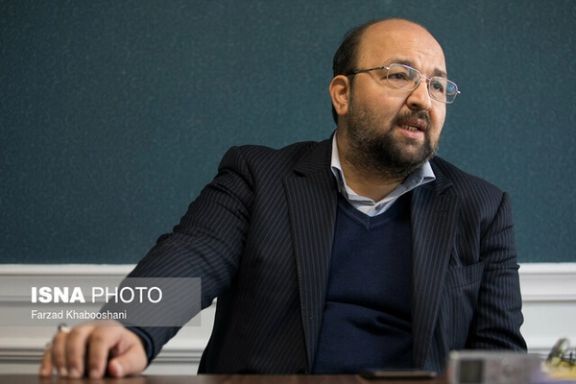
The Spokesman for the Reform Front, Javad Emam, told the press that in fact "It is not the reformists, but those who deprived the people of fair elections who have boycotted the upcoming parliamentary elections."
He elaborated by saying, "We have no issues with the ballot box, as it represents the will of the nation. However, regrettably, the people have been denied the opportunity for a fair electoral process through the ballot boxes." Emam went on to express his perspective that "The current state of affairs in Iran deviates from the ideals of the 1979 revolution. The people have been deprived of their constitutional right to shape their own destiny." He further added, "This deviation from the Constitutional Law calls for the restoration of the people's political participation."
The spokesperson also emphasized that the public's trust in the government has been severely eroded following the protests of the previous year. As long as this trust remains unrestored, “we, as reformists, find it challenging to engage people's interest in participating in elections.”
Meanwhile, centrist politician Gholamhossein Karbaschi said in an interview with the official news agency IRNA that "If reformists wish to boycott the elections, they had better declare this boycott publicly rather than keeping silent about it."
He made it clear that he is no longer a member of the reform front, adding that "I do not like the political taste of the Reform Front." Karbaschi had earlier declared his opposition to a woman, Azar Mansoori, being the leader of the front. In this interview he said: "The Reform Camp's former leader, Behzad Nabavi preferred reform over revolution."
Further explaining his opposition to boycotting the elections, Karbaschi reiterated that "Blind radicalism in the reform front will not lead to anywhere." He explained that reformist cannot be in the reform camp and be part of the opposition at the same time, but this is a situation that has been imposed on the reform camp by the government.
Karbaschi’s criticism of reformists contrasts with the opinion of the anti-regime opposition that sees them as responsible for keeping the Islamic Republic alive, by promising people reforms for 25 years.
Former President Hassan Rouhai had earlier warned Iran's ruling ultraconservatives in a message to his own Moderation and Development Party that the government is wasting the opportunity for coming to an understanding with the people and that if the government fails to pave the way for everyone's political participation, it is likely to lose its ability to solve domestic and international problems.
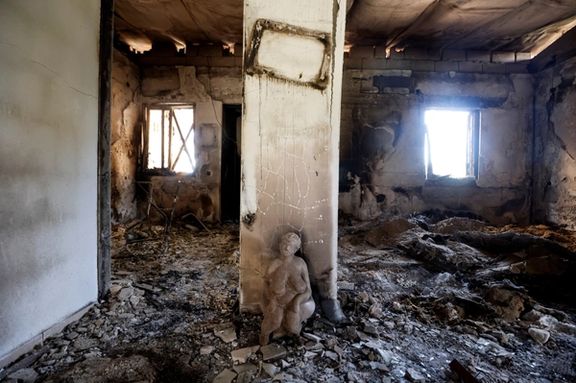
The US has proposed a draft UN Security Council resolution that says Israel has a right to defend itself and demands Iran stop arming "militias and terrorist groups."
The draft text calls for the protection of civilians - including those who are trying to get to safety - notes that states must comply with international law when responding to "terrorist attacks", and urges the "continuous, sufficient and unhindered" delivery of aid to the Gaza Strip, according to Reuters.
It was not immediately clear if or when the United States planned to put the draft resolution to a vote. To pass, a resolution needs at least nine votes in favor and no vetoes by Iran allies Russia, China.
There was no response by Tehran as of Sunday morning. Government media mentioned the news in passing, while it had less coverage of the conflict compared to previous days.
The move by the United States comes after it vetoed a Brazilian-drafted text on Wednesday that would have called for humanitarian pauses in the conflict between Israel and Palestinian Hamas militants, to allow aid access to Gaza.
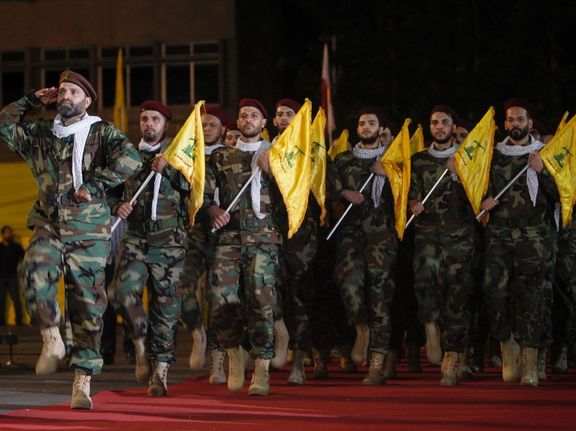
Israel has vowed to wipe out the Hamas Islamist group that rules Gaza, after its gunmen burst through the barrier fence surrounding the enclave on October 7 and rampaged through Israeli towns and kibbutzes, killing 1,400 people.
Israel has since pounded Gaza from the air, imposed a siege and is preparing for a ground offensive. Palestinian authorities say more than 4,000 people have been killed in the enclave. The UN says more than a million have been made homeless.
Iranian regime officials throughout the week continued threatening to expand the war if Israeli attacks on Gaza do not stop. Iran’s intelligence chief, Esmail Khatib, warned the United Statesand other ‘supporters’ of Israel on Saturday that they would face a ‘harsh, fatal revenge’ from God and the people.
Israel's Minister of Economy and Industry, Nir Barkat, warned that Israel would take action not only against the Hezbollah but also against Iran if Hezbollah takes action against Israel on its northern border, claiming "we will go to the head of the snake, which is Iran".
The US draft text does not call for any pause or truce in the fighting. It calls on all states to try and stop the "violence in Gaza from spilling over or expanding to other areas in the region, including by demanding the immediate cessation by Hezbollah and other armed groups of all attacks."
Lebanon's Iran-backed, heavily armed Hezbollah group has clashed with Israel across the Lebanese border multiple times since October 7 in the deadliest confrontations since they fought a month-long war in 2006.
SELF-DEFENSE
The US draft resolution demands Iran stops exporting arms to groups threatening peace and security across the region, including Hamas.
Iran has made no secret of its backing for Hamas, funding and arming the group and another Palestinian militant organization Islamic Jihad. Hamas officials have also confirmed that they received weapons from Iran and Hezbollah.
Article 51 covers the individual or collective right of states to self-defense against armed attack and states must immediately inform the 15-member Security Council of any action that states take in self-defense against armed attack.
In a letter sent the same day as the Hamas attack, Israel told the council it would "act in any way necessary to protect its citizens and sovereignty from the ongoing terrorist attacks originating from the Gaza Strip." But it does not appear to have formally invoked Article 51, diplomats said.
Arab countries have argued that Israel cannot justify its actions as self-defense.
"The Gaza Strip is an occupied territory," Jordan's UN Ambassador Mahmoud Daifallah Hmoud told the council on October 16, citing a 2004 opinion by the International Court of Justice on an Israeli separation barrier built around the West Bank.
With reporting by Reuters